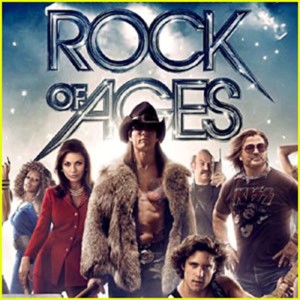by Mr. Stephen Himes
“Rock of Ages” is the most cynical kind of Hollywood money grab: a lame adaptation of a lame Broadway show that blandicizes a menacing musical era into auto-tuned middle brow palatability. Worse, rather than simply blandicizing the bland–like the bland-upon-bland of young attractive people karioke Billy Joel and Abba–”Rock of Ages” neuters the music of a turbulent era into an inoffensive psuedo-spectacle. Sure, “Rock of Ages” is meant as nothing more than a big dumb Hollywood/Broadway nostalgia trip for Gen Xers who’ll lay down $100 for Bon Jovi tickets, but its white-washing of history is offensive.
 “Rock of Ages” is set in the mid-80s Sunset Strip area of Los Angeles, which sits outside the Los Angeles city limits. As such, the LAPD lacks jurisdiction, leaving a somewhat unpoliced area for music and drug scenes to flourish. After the 1970s, which saw bands like The Doors and Led Zeppelin frequent legendary show bars like Whisky a Go Go and Roxy, more stylized acts moved in during the early 80s, like disco goddess Donna Summer and synth-pop group The Bangles. By the mid 80’s, hard rock returned, but with the make-uped stylishness of New Wave, fusing hard rock music and a costumed look into the “glam metal” genre.
“Rock of Ages” is set in the mid-80s Sunset Strip area of Los Angeles, which sits outside the Los Angeles city limits. As such, the LAPD lacks jurisdiction, leaving a somewhat unpoliced area for music and drug scenes to flourish. After the 1970s, which saw bands like The Doors and Led Zeppelin frequent legendary show bars like Whisky a Go Go and Roxy, more stylized acts moved in during the early 80s, like disco goddess Donna Summer and synth-pop group The Bangles. By the mid 80’s, hard rock returned, but with the make-uped stylishness of New Wave, fusing hard rock music and a costumed look into the “glam metal” genre.
The mid-80’s Sunset Strip became a haven for bands like Cinderella, Poison, and Motley Crue, which drew young people from across the country, not unlike the migration to San Francisco’s Haight-Ashbury neighborhood in the late 60s. As the population swelled, junkies lined the streets, the neighborhood was trashed, and an intense drug culture took root. Perhaps the most famous and successful Sunset Strip glam metal band was Guns ‘n Roses, whose “Welcome to the Jungle” became the Strip’s anthem. The video features lead singer Axl Rose stepping off a bus and immediately propositioned by a drug dealer (guitarist Izzy Stradlin); later, Axl walks the streets with a brown bag of liquor looking through the dirty windows of bars at rock-haired guitarists blaring riffs into half-empty, dilapidated buildings–and watching multiple screens of television news broadcasting the LAPD lobbing tear gas at mobs and clubbing people with nightsticks. More than any song, “Welcome to the Jungle” captures the lawless decadence of 80’s era Sunset Strip. Or, as Axl screams, “If you’ve got the money, honey, we got your disease.”
In some ways, the glam metal era foreshadowed the total societal breakdown in Los Angeles, encapsulated by the Rodney King riots of 1992. In much of the city, the police department lost control of the neighborhoods and city government couldn’t function. Entire city blocks burned to the ground, the result of rioting, looting, and vandalism. Los Angeles, for all practical purposes, was ungoverned.
I don’t expect “Rock of Ages” to be a narrative essay on the disintegration of Los Angeles, but it’s fundamentally dishonest to cast the upbeat, San Francisco-based, radio-friendly pop of Journey’s “Don’t Stop Believin’” as an icon of one of America’s most deranged neighborhoods. The Sunset Strip was a lawless urban jungle where a charismatic, talented man could turn himself into a rock god.
The one true thing in “Rock of Ages” is the most fascinating Hollywood performance of the year: Tom Cruise as Stacee Jaxx.
In “Rock of Ages,” Jaxx is the rock god of Sunset Strip glam metal, a riff on “Axl Rose, Keith Richards, and Jim Morrison,” according to director Adam Shankman. The plot, for what it’s worth, is about a club owner’s struggle (Alec Baldwin) to avoid bankruptcy, so he needs Stacee to repay his big break with…one…last…show. Jaxx, now a deranged, distant, deliberately unreliable megastar, shows up and acts weird. There’s a lot more plot (Night Ranger’s “Sister Christian” is reimagined as an off-the-bus Strip transplant from Tulsa), but none of that matters–only the jungle aspect of “Rock” truly interesting.
Jaxx’s first scene is set in a jungle-themed suite of fake canopy trees and leopard spotted sheets, with Jaxx passed out underneath a pile of coked-out supermodels–a parody of rock star decadence. Jaxx arises with a far out, spacey glare into some unknown distance. People say things to him, direct him and ask questions, to which Jaxx just asks for bourbon. He doesn’t show up on time, he can’t be bothered for interviews, cares little for his band–his entire existence is indulging his rock star appetites of drugs, booze, women, and music. He wanders aimlessly, doling out vague pseudo-wisdom about the uniqueness of his existence: “I know me better than anyone…because I live here (points to his head)…and no one else can.” Then his personal attendant bangs a gong, Jaxx stands up and reveals his backless leather chaps and a light-up codpiece.
The only time Jaxx springs to life is onstage, energized by the minions who worship him with a rain of cheap booze while he belts out Def Leppard’s “Pour Some Sugar on Me.” The rest of his life is a petty indulgence that he dresses up with deep, philosophical meaning. It’s just vague enough to sound profound (“I”m dangerous even to my own heart”), but at its heart, the great man has become small in all but reputation. He’s incoherent, mumbling pseudo-profundities that make sense only to those into the Cult of Jaxx. In this scene, an interview with a Rolling Stone reporter (Malin Ackerman), Jaxx answers a serious question about the evolution of his music with something about cultural trends, trailing into, literally, “blah blah blah, blah blah blah blah blah.” The reporter retorts that some say he’s “difficult to work with,” to which Jaxx earnestly responds, “Have these people…even met themselves?”
Slate’s Dana Stevens called this Jaxx’s “ersatz-Marlon Brando B.S.”–a comparison that points to a deeper truth about Cruise’s performance. Cruise’s Jaxx is no joke–he takes himself deadly serious, holding the gaze of everyone in the room because he has lived how few people can imagine. Jaxx sings Bon Jovi’s “Wanted Dead or Alive” as if anticipating his own death, subsisting only on the adrenaline of performance. He gets away with what he wants because he doesn’t play by society’s rules. Whatever else we might say, Stacee Jaxx a remarkable man who’s kicked himself loose of the earth.
Advanced World Literature students will remember the clip of Marlon Brando in “Apocalypse Now!,” Francis Ford Coppola’s cinematic adaptation of Heart of Darkness to the Vietnam War. The bald, babbling Kurtz mumbling to Marlow, “You’re not a soldier; you’re an errand boy sent by grocery clerks to collect a bill,” while the Russian Trader character, played with manic incoherence by Dennis Hopper, just says, “He’s really going now, man!”
At its core, Cruise’s Jaxx is less Axl Rose and more Kurtz. In fact, Cruise’s Stacee Jaxx is an autobiographical insight into Cruise’s own being–an inadvertent explanation of why he’s the strangest megastar in Hollywood.
The performance is so enrapturing because Tom Cruise is one of the handful of actors who could possibly understand Stacee Jaxx. Tom Cruise was the first mega-international movie star of the mass media age. The 1980s gave rise to cable television, MTV, and home video, which gave Cruise a measure of fame, wealth, and power few actors had ever enjoyed. “Risky Business” made him a star when home videos stores first hit, and “Top Gun” was the biggest movie in the first mass distribution of VCR rentals and proliferation of MTV, which showed a cocky, shirtless Cruise once an hour in Kenny Loggins’ “Danger Zone’ video. Cruise spawned so many hits, he eventually kicked himself loose of Hollywood studio control.
Cruise’s first wife Mimi Rogers introduced him to Scientology and its mythology of thetans, clears, and all the rest. Called a cult by some, Scientology has reportedly surrounded Cruise with an insular support group that professes his wisdom on the ways of their faith. When Paramount Pictures severed their relationship with Cruise for his erratic behavior, he simply bought United Artists his friend Paula Wagner. There are few producers with as much power as Tom Cruise, who now casts himself in movies of his own making.
Beyond business, if Vanity Fair is to be believed, Scientology has evolved into a source of virtual slave labor catering to Tom Cruise’s most extravagant needs. David Miscavige, Scientology’s top officer, personally cultivates and uses his friendship with Cruise, assigning fellow Scientologists at “camps” to tend to Cruise’s SUV detailing and speaker systems. Miscavige also played a key role in alienating Cruise’s second wife, Nicole Kidman, from the religion because it drew Cruise away from his practice. Scientologists even “recruited” the next Mrs. Cruise, Katie Holmes, by auditing different women to find someone compatible with the religion. In short, Tom Cruise has a cult devoted to his worship and the indulgence of his appetites.
Is it any wonder why he’s so weird? He’s been the world’s biggest movie star for 25 years, he runs his own studio to indulge his own tastes, he’s so wealthy that money is no object, and he literally has a religion that is, in part, dedicated to praising his “contributions.” And, until recently, a wife who grew up with a picture of her future husband on her bedroom wall.
Like Kurtz, Tom Cruise doesn’t break the rules of civilization; they simply don’t apply to him. Watching Cruise in “Rock of Ages” is like watching Marlow talk with Kurtz in his hut. We’ve all heard the tabloid legend of Cruise, like the Russian Trader babbling on about Kurtz’s “accomplishments.” But to actually see a man go so deeply inside his own head that he’s all id–it’s disturbing for precisely the reason Marlow feels himself becoming more “scientifically interesting” in the jungle. There’s little difference between Stacee Jaxx’s belting of “Dead or Alive,” Kurtz making himself a god to the natives, and Tom Cruise conducting “seminars” for friends and family about how Katie Holmes would give birth: they are all idols unto themselves..
Of course, “Rock of Ages” doesn’t understand the power of its creation. Stacee Jaxx shouldn’t “hit rock bottom,” as the rock star cliche goes. He shouldn’t reform himself after a near overdose; he’s incapable for reform because his morality is defined solely by the satisfaction of his appetites. He has any woman he wants because he can. He drinks a fifth of whiskey every day because he can. He ignores his manager because he can. He shows up for the show a day late because his worshippers will show up the next night just to bask in his presence. We know how this story should end: When Marlow tries to drag Kurtz to the boat back to civilization, Kurtz looks back at the witchman’s fire and starts crawling because he can’t exist in the world we do. If “Rock of Ages” understood what Tom Cruise does, the film would end with Stacee Jaxx wandering back into the anarchy of the Strip, where his minions can worship him into death–either his or their own. We don’t know what lies ahead for Tom Cruise, but if Stacee Jaxx had his way, I suspect, he’d offer Kurtz’ advice: “Exterminate the brutes!” Welcome to the jungle, indeed.














